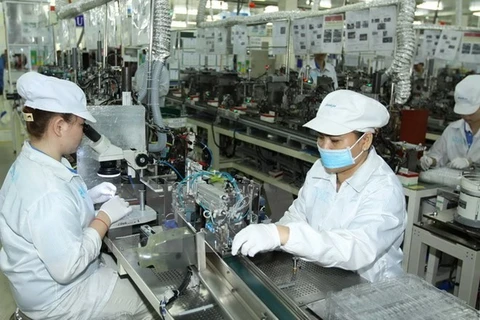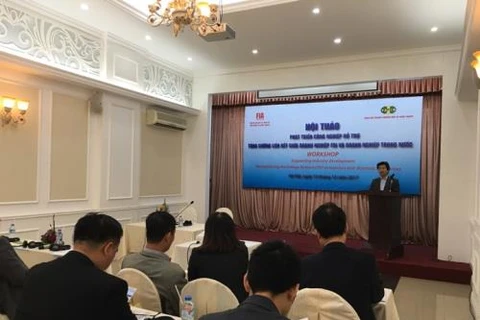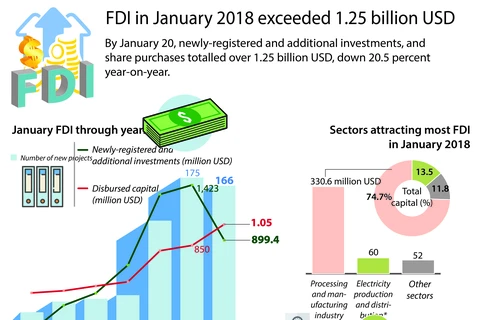 FDI enterprises have achieved the highest profit growth among the economic sectors but pay the lowest taxes (Photo: VNA)
FDI enterprises have achieved the highest profit growth among the economic sectors but pay the lowest taxes (Photo: VNA) Hanoi (VNA) - Foreign direct investment (FDI) enterprises, which have enjoyed multiple tax incentives, pay the lowest State taxes despite reporting high profits, statistics show.
FDI enterprises have achieved the highest profit growth among the economic sectors, generating 327.4 trillion VND (14.4 billion USD) in pre-tax profits in 2016, an increase of 17.3 percent on average in the 2010-16 period, according to the latest report by the General Statistics Office (GSO).
This amount accounted for 45.9 percent of the total profits earned by businesses across all sectors in 2016. However, they paid the lowest taxes to the State budget, amounting to only 250.9 trillion VND in 2016.
State-owned enterprises, comprising the largest number of companies and employees, earned 197.4 trillion VND in 2016, accounting for 27.7 percent of profits earned by all businesses, marking a 9.4 percent rise per year from 2010 to 2016.
The State-owned sector contributed 277.3 trillion VND to the State budget in 2016, an increase of 10.4 percent per year in the five years leading up to 2016.
Meanwhile, non-State enterprises reported the lowest pre-tax profits of 188.1 trillion VND in 2016 but paid the highest taxes to the State budget, at 434.7 trillion VND, an increase of 17 percent in the 2010-16 period.
[VN targets parity between FDI, domestic firms]
"The FDI sector earns large profits, more than the other economic sectors, including State-owned and private enterprises, but its contribution to the State budget is lower," said Pham Dinh Thuy, director of the GSO’s Industrial Statistics Department.
Thuy said FDI businesses were involved in industry and the hi-tech sector, which enjoyed many types of tax incentives, including those regarding corporate income.
He cited examples of Samsung Thai Nguyen and Samsung Bac Ninh, which are exempt from corporate income tax for the first four years of operation and must pay some 10 percent in corporate income tax in the following 27 years, half the amount domestic companies must pay.
Meanwhile, hi-tech FDI companies are exempt from import taxes on raw materials, spare parts and components.
In addition, many localities have implemented their own tax incentives to attract more FDI enterprises.
Some FDI businesses have abused the legal loopholes for transfer pricing, evading VAT, which reduced their payable tax obligations.
Thuy said the government has asked the Ministry of Planning and Investment and Ministry of Finance to review the law to help reign in transfer pricing by foreign enterprises, as well as check the tax policies of the localities to ensure a fair business environment across all economic sectors. – VNA
VNA
























